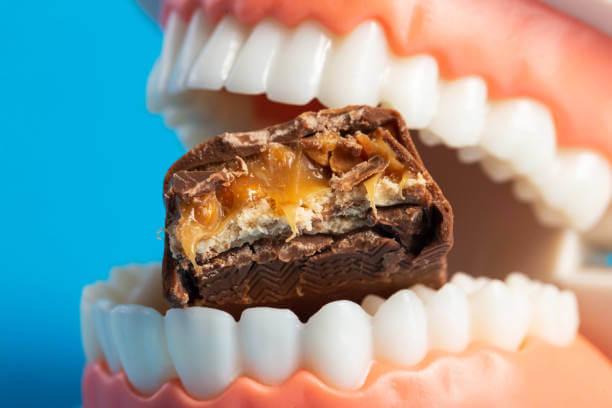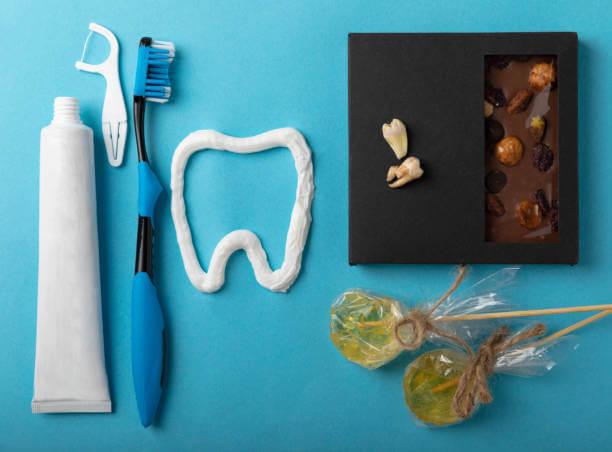

Do you find yourself wincing in pain when you indulge in an ice-cold soda or a scoop of your cherished ice cream? If so, you might be dealing with teeth sensitive to sugar, a common dental concern that can put a damper on your enjoyment of sweet delights.
This guide is here to assist you in tackling this problem. Let’s explore the ins and outs of sugar sensitivity in teeth, including what causes it, symptoms to look out for, and—most importantly—how to satisfy your sweet tooth without causing unpleasant consequences.
Tooth-sensitive to sugar is a common dental concern for many people. This discomfort can range from a mild tingling to intense pain.
The main reason for teeth becoming sensitive to sugar is the wear and tear of tooth enamel or the receding of gums, which exposes the dentin layer. Dentin has direct pathways to the tooth's nerves, so when sugar reaches these areas, it can result in pain or discomfort.
Our teeth are protected by enamel, the strongest substance in the body. The dentin underneath this layer contains small channels that connect to the tooth's nerve core. These channels are exposed by enamel degradation, causing teeth to react to sugar and other external factors.
Contrary to some beliefs, sugar itself is not the direct cause of tooth sensitivity, but it can exacerbate existing dental issues. When sugar is consumed, it interacts with bacteria in your mouth, creating acids that can further erode tooth enamel.
Essentially, grasping the link between sugar and tooth sensitivity requires knowledge of sugar's indirect impact on overall dental health, along with the essential functions played by dentin and enamel in protecting our teeth.
Teeth sensitivity to sugar can stem from various dental issues, each contributing to this bothersome experience. These include:
The erosion of tooth enamel, which is your teeth's protective outer layer, leaves the underlying dentin exposed. When sugar comes into contact with this exposed dentin, it can cause discomfort.
Sugars are a primary food source for harmful oral bacteria. These bacteria produce acids that attack the enamel, leading to cavities. These cavities, in turn, make your teeth more prone to sugar-induced pain.
Gums can recede for various reasons, exposing the roots of the teeth. These roots do not have a protective enamel layer and are more sensitive. Consequently, sugar can irritate these exposed areas, leading to sensitivity.
Teeth are more susceptible to sensitivity when they have been damaged in any way, including having cracks or chips in them. Sugar has the potential to penetrate these injured areas, which will make the agony much worse.
Sugar sensitivity in teeth can stem from different dental issues, highlighting the importance of maintaining good oral hygiene and seeking regular dental care to prevent or manage these problems.

Sugar-induced tooth sensitivity doesn't creep up on you; instead, it announces its presence with clear and identifiable indicators. Among these are:
Taking action at the very beginning can make a significant difference in preserving your dental well-being and preventing potential complications down the road.
Sensitive teeth can cause discomfort and hinder your daily activities, but there are several effective treatments available. Below are some options you can explore:
Special toothpastes are designed to lessen the pain associated with sensitive teeth. These toothpastes contain ingredients that block pain signals from the tooth's surface to its nerve, reducing discomfort.
For stronger tooth enamel and reduced sensitivity, dentists often recommend fluoride treatments. These treatments enhance the tooth's resistance to acid attacks from plaque bacteria and sugars in the mouth.
The use of dental sealants can be thought of as a shield that protects your teeth. They are a thin coating that successfully prevents discomfort caused by sugary foods and drinks by sealing exposed and sensitive parts of the teeth.
In cases of severe sensitivity, dental procedures such as bonding, crowns, or inlays might be necessary. You can get long-term comfort from these procedures, and your dentist will help you choose the best one.
Alongside professional treatments, there are home remedies you can try for temporary relief from tooth sensitivity. Such as:
A simple saltwater rinse can ease pain and reduce inflammation. Mix a teaspoon of salt in warm water and rinse your mouth to alleviate discomfort.
Known for its pain-relieving properties, clove oil can be applied in small quantities to the sensitive area for temporary pain relief.
In instances where the aforementioned treatments and remedies aren't relieving your sensitive teeth, seek professional dental care. They can assess your condition, recommend tailored solutions, and provide the relief you need.
Taking proactive steps in your daily dental care routine can go a long way toward managing sugar-induced tooth sensitivity. Here are some practical measures to consider:
By adopting these preventive measures and incorporating them into your life, you can actively manage your sugar sensitivity, leading to less discomfort.

Teeth sensitivity to sugar can be more than just a minor annoyance—it can significantly impact your quality of life. At Junca Dental, we understand the suffering and inconvenience this sensitivity can cause.
Our holistic, patient-centered approach offers desensitizing treatments and expert preventive care. We are committed to addressing your immediate pain while also educating you so that you can have a pain-free smile for the long haul.
Schedule an appointment today and let us help you rediscover the joy of indulging in your favorite treats with confidence!
In the battle against teeth sensitive to sugar, knowledge is your most potent weapon. Armed with the information provided in this guide, you can take proactive steps to alleviate discomfort and enjoy your favorite sugary treats once again.
Remember, a healthy smile starts with awareness and proactive care. It's not about completely giving up on sugar, but finding the right balance and protecting your precious pearly whites.
